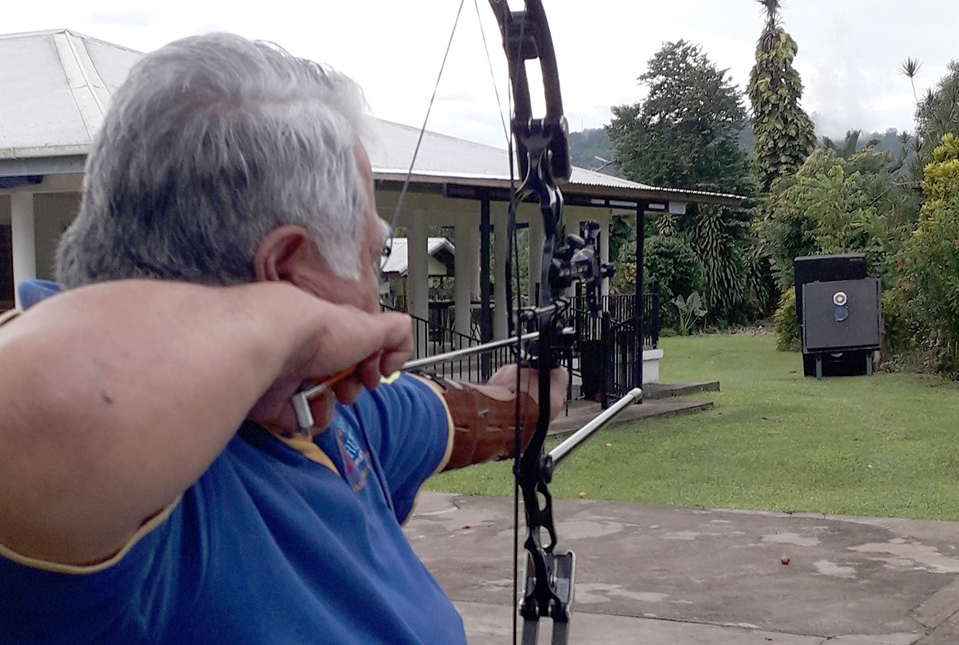
By Michael Pavitt |
Samoan Prime Minister Tuilaepa Aiono Sailele Malielegaoi recently announced his intention to compete at this year’s Pacific Games in Apia.
The declaration might appear out of the ordinary, but the 74-year-old previously achieved the feat when Samoa last hosted the Games in 2007.
Prime Minister Tuilaepa was claimed to have taken up archery just five months prior to the Games.
“I thought it was a good opportunity to show to our young men and women that even the leaders are prepared to act to give examples,” Tuilaepa told the New Zealand Herald at the time. “The sport has special appeal for me because it does not make as much demand on my time compared with other sports.”
Tuilaepa unsurprisingly was the first elected leader of a country to participate in a multi-sport event.
He soon became the first to achieve a podium finish at a Games, after being part of the Samoan mixed recurve team which clinched a silver medal. His son was a reserve member of the team.
One can only hope a repeat performance is on the cards as the Games returns to Samoa’s capital in July, although the Prime Minister claiming he would not be able to walk into the team. Especially as there is a Tokyo 2020 team event spot up for grabs.
Francisco Boza Dibos achieved a similar feat at the Toronto 2015 Pan American Games, although his feat was slightly less remarkable.
Dibos was a veteran of seven Olympics, with his run including a silver medal at Los Angeles 1984. The athlete then turned into an official, becoming the head of the Peruvian Sports Institute three years prior to the Pan American Games.
He then came out of sporting retirement for the Games, where a shock trap shooting gold saw him clinch a quota spot for the Rio 2016 Olympic Games.
Dibos, who was also serving as the secretary general of the Peruvian Olympic Committee (COP), was rewarded for his achievement by being the country’s flagbearer at the Opening Ceremony in Rio. He ultimately failed to make it out of qualifying in the trap competition.
The Peruvian’s journey has taken a couple of bumps since, after departing the COP following charges of collusion and criminal conspiracy back in 2017.
He had been accused of asking Martin Belaunde, a businessman and former Presidential advisor to use his influence in Congress to approve funding for the 2013 Bolivarian Games in Trujillo while he was head of the Peruvian Institute of Sports. This allegedly led to Spanish construction company Antalsis, a client of Belaunde, being awarded the contract to redesign Elias Aguirre Stadium.
Dibós avoided a jail sentence last year, with the official having denied wrongdoing.
While there is a shortage of politicians-turned-athletes, there are several cases the opposite way around.
One of the most famous cases in the United Kingdom is Sebastian Coe, who went from double Olympic champion on the track to a Conservative member of Parliament. He is now a life peer in the House of Lords and has the small sporting task of being the President of the Association of International Athletics Federations.
The House of Lords also features 16-time Paralympic medallist Tanni Grey-Thompson and Menzies Campbell.
The latter, who can be referred to by his title Lord Campbell of Pittenweem, held the British record in the men’s 100 metres for seven years having achieved a time of 10.2 seconds twice in 1967. A month on from his first 10.2 clocking, Campbell won a race which featured the young sprinter OJ Simpson, who later turned his hand to American football.
Campbell competed in both the 200 metres and Britain’s 4x100m team at the Tokyo 1964 Olympics, before captaining Scotland’s athletics team at the Commonwealth Games two years later in Kingston.
The sprinter had enjoyed medal success at Summer Universiades, winning five medals across three editions. This included a gold medal as part of Britain’s 4x400m relay team at Porto Alegre in 1963.
Having also turned his hand to politics, Campbell would later spend a year as leader of the Liberal Democrats from 2006 to 2007. His involvement in sporting circles has continued as Campbell remains a listed as an arbitrator at the Court of Arbitration for Sport.
A more recent example of a sporting star turned politician is Romario, Brazil’s 1994 World Cup winning striker. Romario completed the transition from penalty box poacher to lawmaker, having been elected as a senator for Rio de Janeiro.
Romario transition into the role did not see him lose sight of sporting issues, with the Brazilian having been vocal on the issue of sporting corruption.
In 2017 he called for a Parliamentary Commission Inquiry to investigate Carlos Nuzman and the Brazilian Olympic Committee, having previously conducted a similar probe against the Brazilian Football Confederation and the 2014 FIFA World Cup.
In 2012, former Olympic Council of Ireland President Patrick Hickey dismissed claims made by Romário that he had ensured the contract for ticket sales in Ireland for Rio 2016 would go to a firm that employed his son Stephen. Hickey was later arrested at Rio 2016 and charged with ticketing offences, which he denies.
Boxers Manny Pacquiao and Vitali Klitschko have become both a Senator in the Philippines and Mayor of Kiev, respectively.
Six-time Olympic fencing medallist Pavel Kolobkov has arguably taken the most logical step up to office, having been Russia’s Sports Minister since late 2016. The same can also be said for the IOC Athletes Commission chair Kirsty Coventry, who is Zimbabwe’s Sports Minister.
Cricketer Imran Khan and footballer George Weah have achieved the ultimate transition from sporting star to politicians, with the duo currently serving as Presidents of Pakistan and Liberia, respectively.
While there is a fairly regular stream of athletes-turned-politicians, Samoa’s Prime Minister’s status is probably safe for a while as the only elected leader to compete at a multi-sport event.
Republished with permission from insidethegames.biz